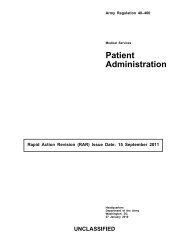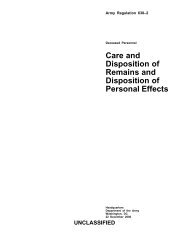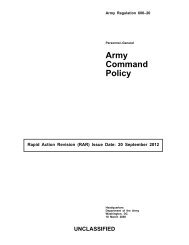Officer Transfers and Discharges - Army Publishing Directorate ...
Officer Transfers and Discharges - Army Publishing Directorate ...
Officer Transfers and Discharges - Army Publishing Directorate ...
Create successful ePaper yourself
Turn your PDF publications into a flip-book with our unique Google optimized e-Paper software.
written request) include a minority, female, or special branch as voting member (if reasonably available, as this<br />
provision is not an entitlement). If an officer is in more than one category <strong>and</strong> he or she requests officers from all or<br />
two categories, the board membership may be met by one or more officers (if reasonably available, as this provision is<br />
not an entitlement). The request for these members, if desired, will be submitted 7 days from the date that the<br />
respondent receives the notification or else the right to request is waived.<br />
e. When the reasons for elimination include subst<strong>and</strong>ard performance of duty (para 4–2, except 4–2a(9)), the board<br />
membership will include an officer of the same branch as the respondent (if reasonably available, as this is not an<br />
entitlement). Normally, this is the only time a Chaplain, AMEDD, or JAGC officer serves as a board member unless he<br />
or she is the only available RC colonel in the area <strong>and</strong> the respondent is an RC officer.<br />
f. No officer will be a voting member of a Board of Inquiry who—<br />
(1) Is serving (or has previously served) as a witness for the respondent.<br />
(2) Served as a member of the selection board in the particular case or served as a member on any previous Board<br />
of Inquiry, Review, or other board of officers with respect to the respondent.<br />
(3) Was a member (or was the reviewing authority) of a previous court-martial in which the respondent was the<br />
accused.<br />
(4) Previously recommended (or participated in recommending) the respondent for elimination from AD.<br />
(5) Rendered a derogatory evaluation report on the respondent.<br />
(6) Otherwise considered the respondent’s case.<br />
g. In addition to the reasons stated in f above, voting members <strong>and</strong> the legal advisor may be challenged for cause for<br />
any reason that indicates they can not participate in the case in a fair <strong>and</strong> impartial manner. The challenge will be<br />
determined by the senior unchallenged board member.<br />
h. Except for the legal advisor <strong>and</strong> the recorder, only voting members may attend a closed session.<br />
4–8. President of the Board of Inquiry<br />
The board’s president—<br />
a. Ensures the respondent is granted reasonable time to prepare <strong>and</strong> present their case. Undue delay will not be<br />
permitted <strong>and</strong> the case will be conducted as expeditiously as possible.<br />
b. Determines the board’s convene date (not earlier than 30 calendar days from the officer’s receipt of notification to<br />
show cause by CG, HRC, or GOSCA).<br />
c. Will make every effort to ensure Board of Inquiry is completed no later than 90 calendar days from the date the<br />
GOSCA directs that a Board of Inquiry be conducted.<br />
d. Secures a proper location with an atmosphere consistent with the spirit <strong>and</strong> seriousness of the proceedings.<br />
e. Calls each session to order formally.<br />
f. Administers the oath to the recorder.<br />
g. Ensures the board members are familiar with the elimination policy of this regulation <strong>and</strong> have been afforded the<br />
opportunity to examine <strong>and</strong> study the respondent’s elimination packet <strong>and</strong> complete OMPF prior to convening the<br />
Board of Inquiry <strong>and</strong> asked if they are aware of any grounds that might be the basis for challenge for cause.<br />
h. Advises the respondent of responsibilities, rights, <strong>and</strong> options as outlined in paragraph 4–11.<br />
4–9. Recorder of the Board of Inquiry<br />
a. The board recorder will be a Judge Advocate or DA civilian attorney who is permanently assigned to the board.<br />
The board service will constitute the recorder’s primary duty; however, it will not preclude other duties when the<br />
workload permits. (Alternate or assistant recorders may be detailed to the Board of Inquiry.)<br />
b. The recorder is responsible for the proper presentation <strong>and</strong> h<strong>and</strong>ling of the Government case, to include the<br />
development of new evidence pertinent to the factual allegations in the case. The recorder’s duties are not discharged<br />
by a perfunctory entering in the record of evidence provided by the Department of the <strong>Army</strong>. The recorder will<br />
investigate the case, seek new evidence that may be locally available, <strong>and</strong> become thoroughly familiar with the<br />
respondent’s history <strong>and</strong> the deficiencies or conduct (as appropriate) that led the selection board, CG, HRC, or GOSCA<br />
to conclude that the officer fails to meet prescribed st<strong>and</strong>ards or has been derelict in moral professional duties. The<br />
recorder will also be able to place evidence offered by the respondent in perspective with the remainder of the officer’s<br />
military record.<br />
c. If during the course of the recorder’s investigation of the case, the recorder finds additional evidence similar in<br />
nature to that previously presented to the officer under paragraph 4–2, that evidence is admissible. This additional<br />
evidence may be considered by the Board of Inquiry as proof of an amended or new factual allegation in support of a<br />
reason for elimination.<br />
(1) Only in those instances where the newly discovered evidence results in the addition of a reason for elimination<br />
(not included in the officer’s notification memor<strong>and</strong>um (see para 4–18)) is it necessary to return the case to the CG,<br />
HRC, or GOSCA for issuance of a new notification memor<strong>and</strong>um.<br />
(2) The fact that the additional evidence may support the stated reason of conduct unbecoming an officer (see para<br />
AR 600–8–24 12 April 2006<br />
61
















